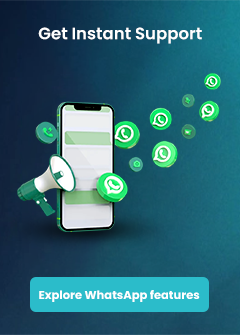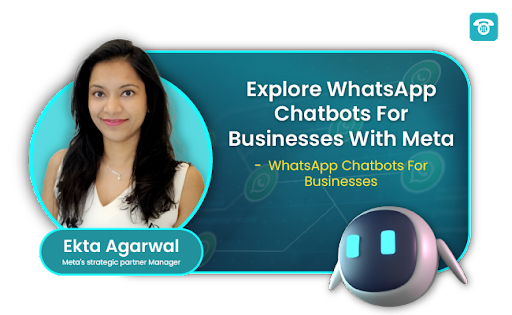You’ve probably noticed how seamlessly some businesses handle their customer interactions on WhatsApp, turning routine chats into live engagement channels.
Ever wondered how they do it?
Let’s uncover the strategies from Meta’s strategic partner manager, Ekta Agarwal in our special session on WhatsApp chatbots.
Her segment, “Masterclass with Meta | WhatsApp Chatbots For Businesses,” provided a deep dive into the strategic implementation of chatbots, illustrating how they can go beyond mere automation to become a critical component of your digital engagement strategy.
Here’s an exclusive look at how integrating chatbot solutions on WhatsApp can become a key part of your business communication toolkit.
WhatsApp Chatbots For Businesses
Introduction to WhatsApp for Business by Ekta Agarwal
“People are present on WhatsApp; businesses should be too.”
Ekta Agarwal opened her session by illuminating the extensive reach of WhatsApp, noting its user base of over two billion active users globally. She underscored the significant opportunity this presents for businesses, stating:
“First of all, we all know that people are present on WhatsApp… There are two billion active monthly users… These are people like you and me who are sending messages to friends and family… but there are also 175 million people who are communicating with a WhatsApp business account every day.”
The Three Main Facets of WhatsApp’s Services
Ekta provided a clear breakdown of the three versions of WhatsApp available to different types of users, each tailored to meet specific business needs:
1. WhatsApp’s Consumer App:
Commonly utilized for personal communication, this app represents the basic version that most individuals around the world are familiar with. Ekta described this app as:
“The consumer app, which you and I use every day for talking to friends and family.”
2. WhatsApp Business App:
Designed specifically for small businesses, this app allows for direct customer communications in a more structured yet straightforward manner than the consumer app.
Ekta highlighted its utility, saying:
“Then there is the small business app… This app is freely available on all the stores; you can download it… It’s very good for small businesses who are just starting your business.”
3. WhatsApp Business API:
Ideal for medium to large businesses, the WhatsApp Business API caters to companies needing to manage large volumes of messages and integrate various systems such as CRMs and databases.
Ekta emphasized its capabilities for automation and integration:
“Now, if you think you have scaled a little, you want to grow more, then the business platform is the one which is the WhatsApp Business API… It will help you in streamlining all your communications. You can do a lot of automations… and last but not the least, any of your technology stacks which are present, it could be a CRM or it could be as small as a knowledge base… can be seamlessly integrated with WhatsApp Business API.”
Enhancing Customer Interactions with Automated Flows
Choosing the Right WhatsApp Service
Ekta began by reiterating the importance of selecting the appropriate WhatsApp service that aligns with the business’s size and needs—be it the WhatsApp Business App for small businesses or the WhatsApp Business API for medium to large businesses.
She walked the audience through the systematic approach required to implement these tools effectively.
She explained:
“Depending on your business scale—whether you’re just starting out or you’re an established business looking to optimize your operations—the choice between the WhatsApp Business App and the WhatsApp Business API is crucial. The API allows for more complex integrations and automation, essential for handling high volumes of interactions seamlessly.”
Integrating Chatbots with Business Applications
Moving beyond the initial selection, Ekta detailed the integration process of chatbots with existing business applications.
This integration is pivotal for automating responses and managing customer interactions efficiently. She outlined several key integration points:
“Turn conversations into conversions with smart chatbots.”
Ekta also highlighted the technological aspects involved in these integrations:
“Integration of technology stacks, whether they are CRMs, ERP systems, or even simpler databases, is streamlined with the WhatsApp Business API. This not just automates communication but also ensures that all customer interactions are logged and analyzed for improved service delivery.”
Related: Ultimate Guide to Get Started with WhatsApp Chatbot
Creating a Seamless Customer Experience
Ekta emphasized that the goal of setting up chatbots goes beyond operational efficiency; it’s about enhancing the overall customer experience.
She explained how chatbots could be used to create more engaging and personalized customer interactions:
“With the WhatsApp Business API, you can build chatbots that do more than answer common questions. They can guide customers through a purchasing process, provide personalized recommendations based on previous interactions, and even handle complex customer service scenarios without human intervention.”
She continued:
“This level of automation and personalization not only improves efficiency but also significantly enhances the customer experience, making every interaction more engaging and responsive to customer needs.”
Real-World Applications and Success Stories
Ekta Agarwal highlighted several compelling case studies during her presentation, illustrating the practical applications and significant benefits of using WhatsApp, particularly the WhatsApp Business API.
Her focus was on how businesses could leverage or how to get WhatsApp Business APIs capabilities to enhance customer engagement and streamline operations.
Let’s explore each brand:
Tata Cliq: Personalized Shopping Notifications
Ekta discussed how Tata Cliq utilizes WhatsApp to improve customer engagement and conversion rates. She explained:
“For example, Tata Cliq used a lot of use cases… They know the people who have abandoned the cart; they have wishlisted the item and they want to send a price drop alert to them or they want to give a welcome coupon to any of the new users. So, they have used all these different journeys for different types of people and cohorts.”
This utilization of WhatsApp allows Tata Cliq to send personalized shopping notifications and offers based on user behavior such as cart abandonment or item wishlisting.
Bangalore Metro: Simplifying Ticket Bookings
Another example Ekta cited was the use of WhatsApp by Bangalore Metro, which implemented the platform to facilitate easier ticket bookings:
“Coming to the next Journey which is Bangalore Metro so now on Bangalore Metro you can buy tickets on WhatsApp… once you confirm this is your final itinerary, if you want to proceed or make any changes once you proceed you can either pay through WhatsApp or you can pay online payment you can choose any of those methods and once you choose that method you can actually within the journey you can make the payment.”
She detailed how the integration of chatbot functionality within WhatsApp has simplified the ticket booking process for Bangalore Metro.
Policy Bazaar: Enhancing Customer Service and Engagement
Ekta Agarwal highlighted the use of WhatsApp by Policy Bazaar, a leading online insurance aggregator in India, to enhance their customer service and engagement.
She outlined how Policy Bazaar utilizes WhatsApp not just for broadcasting information but also for interactive customer service:
“Policy Bazaar, they used WhatsApp chatbot for cross-selling of their products, for retargeting, for claim settlement process, and for customer experience and for the lead gen. So with using this, they have 30 million messages delivered per month and 5x growth in the bottom funnel metrics as compared to any of the traditional channels.”
Carandbike: Streamlining Car Sales and Purchases
Another compelling use case Ekta mentioned was Carandbike, an online used car marketplace that has transformed how it interacts with customers through WhatsApp. She detailed how Carandbike integrates chatbot functionality to streamline the entire sales process:
“Carandbike, they actually were trying to sell or increase their inventory for old cars. So they created WhatsApp as a new channel itself to increase that supply. What they did is they built a whole flow where they could ask about the location, the make, the model of the car, and then you can finally book a slot for home inspection. So, it’s much easier for me to just fill in that information and you can come home for the home inspection at my selected time.”
Carandbike’s use of WhatsApp simplifies the complex process of buying and selling used cars. By automating initial inquiries and booking inspections through WhatsApp, Carandbike not only enhances customer convenience but also optimizes their operational workflows.
This strategy has led to a significant reduction in the cost per lead and doubled the lead conversion rate, showcasing the power of WhatsApp in transforming traditional business models.
Watch Hook Users With WhatsApp Bots – WhatsApp Wednesdays by MyOperator full webinar here
Hook Users With WhatsApp Bots – WhatsApp Wednesdays by MyOperator
Conclusion
Ekta Agarwal’s masterclass on WhatsApp Chatbots highlighted the irreplaceable role that sophisticated communication tools play in transforming business operations.
Her insights reveal that leveraging WhatsApp’s extensive reach and its advanced business applications can significantly enhance customer engagement, streamline communications, and optimize operational efficiencies.
Ready to scale your CX with MyOperator WhatsApp API?



